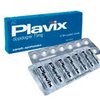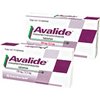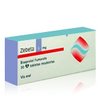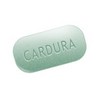INDICATIONS
Plavix is used for reducing the risk of stroke or heart attack in patients who have already had a heart attack or stroke, have other circulatory problems caused by narrowing and hardening of the arteries, or have certain other heart problems (eg, unstable angina). Plavix is a platelet aggregation inhibitor. It works by slowing or stopping platelets from sticking to blood vessel walls or injured tissues.
INSTRUCTIONS
Use Plavix as directed by your doctor.
- Take Plavix by mouth with or without food.
- If you miss a dose of Plavix, take it as soon as possible. If it is almost time for your next dose, skip the missed dose and go back to your regular dosing schedule. Do not take 2 doses at once.
Ask your health care provider any questions you may have about how to use Plavix.
STORAGE
Store Plavix at 77 degrees F (25 degrees C). Brief storage at temperatures between 59 and 86 degrees F (15 and 30 degrees C) is permitted. Store away from heat, moisture, and light. Do not store in the bathroom. Keep Plavix out of the reach of children and away from pets.
MORE INFO:
Active Ingredient: Clopidogrel bisulfate.






